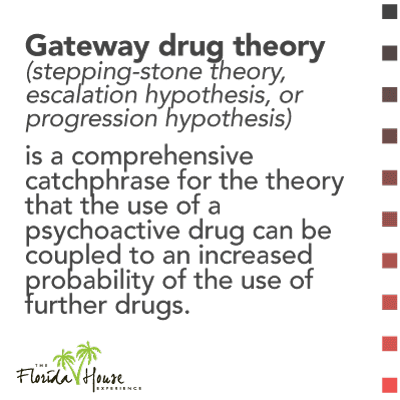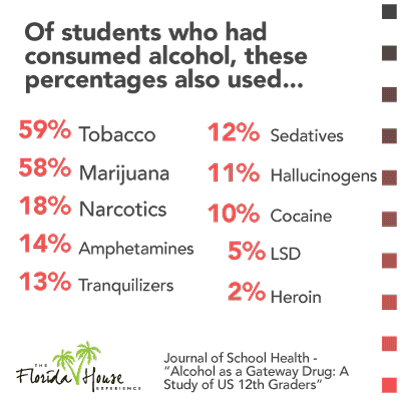
|
|
Alcohol abuse has caused a lot of turmoil and chaos in the lives that it has overtaken. Alcoholism does not happen overnight and as time passes the abuse of alcohol becomes worse. Before you know it, your life can spiral out of control in all areas. Luckily, alcohol addiction treatment will provide the therapy and coping mechanisms that will show you how to rebuild and recreate what your life looks like without alcohol. Understanding and processing the causes, thoughts, and behaviors of your alcohol addiction will be the introduction to a life of recovery. Without the open mind to accept the help that is available there is no saying where alcohol abuse can take someone. There is also the question that has become very common among many people: is alcohol a gateway drug? As one of the most commonly abused legal substances in the world, the chances of alcohol leading a person to the use of other substances is very likely. Let’s take a deeper look at what exactly a gateway drug is and if alcohol can be considered one of them.
Substance Abuse and Gateway Drugs
The roots of substance abuse are complex, and many different factors drive individuals to abuse and addiction. These factors fall into two main groups: genetic factors and environmental ones.
When it comes to alcoholism, around half of the risk is thought to come from inherited traits. If you or someone you know has an addiction, there’s an even chance they had a parent who suffered from the same problem. The other half of addiction risks come from environmental factors, including:
- Upbringing
- Education level
- Abuse or trauma
- A history of mental health disorders
- Poverty
- A changing life situation
- Personality type
Gateway drugs are thought by some to be another environmental risk factor, but this hypothesis has become more controversial in recent years. Of course, any one risk factor is only a small part of the story. For example, someone whose parent had a drug problem may never have trouble with addiction. However, if they experience trauma or lose their job unexpectedly, issues with substance abuse may begin to arise.

What Is a Gateway Drug?
The gateway drug hypothesis originated in the 1970s in a paper by Kandel and Kaust, which linked adolescent experimentation with alcohol, marijuana or nicotine with an increased risk of partaking in more addictive, illegal drugs when they were older. The cause was thought to be changes to brain chemistry stemming from the use of these gateway drugs, which made adolescents more likely to seek out stronger drugs later on.
However, more recent research has been inconclusive in finding supporting evidence for the early use of alcohol, cannabis or nicotine influencing adolescents toward stronger drugs, including physical changes to the brain. Many scientists have instead hypothesized that those predisposed to addictive behavior may just seek out more accessible drugs before moving on to stronger ones.
As mentioned already, risk factors in addiction are complex and it’s almost impossible to pinpoint one specific trigger for an individual’s addiction. Still, there is a correlation between addiction and adolescents who use so-called “gateway drugs,” which means the notion can still be a useful indicator of possible future problems.
What is the History of Gateway Drugs?
The idea that drug use can occur in stages took root in the mid-20th century. The first drug to ever really get the stigma of a “gateway drug” was marijuana. TV shows such as “The Terrible Truth” suggested marijuana use led to heroin addiction. Researchers then began using the term “gateway drug” in the 1980s to describe substances that initiate these stages. Shortly thereafter, studies began to be conducted. In 1985, a report published in the Journal of Youth and Adolescence found alcohol to be a steppingstone to use of heavier drugs. As a result of that report, research on gateway drugs blossomed.
Since the 1980s, educators have warned students about the dangers of gateway drugs through programs such as Drug Abuse Resistance Education (D.A.R.E.). These programs were developed to specifically outline the consequences of three potential gateway drugs: marijuana, alcohol and tobacco. The teaching of gateway drugs has even made its way down into the middle school level.
Is Alcohol a Gateway Drug?
 Many people don’t view alcohol as a gateway drug because it’s readily available. Since anyone 21 or older can legally purchase alcohol, it is typically not viewed in the same light as illegal drugs. In fact, when people think about addiction, they usually think of drugs like prescription opioids or cocaine. However, alcohol can be just as addictive and dangerous as any illicit drug.
Many people don’t view alcohol as a gateway drug because it’s readily available. Since anyone 21 or older can legally purchase alcohol, it is typically not viewed in the same light as illegal drugs. In fact, when people think about addiction, they usually think of drugs like prescription opioids or cocaine. However, alcohol can be just as addictive and dangerous as any illicit drug.
One study on the gateway drug phenomenon found unequivocally that alcohol represented the reality of a gateway drug. It led to the use of marijuana, tobacco and other illicit substances. The study from the Journal of Scholastic Health found that young people who drank were more likely to use drugs. Unfortunately, the numbers are striking too. High school seniors who used alcohol were 16 times more likely to use marijuana and other narcotics.
Although the research is inconclusive as to where cause and effect lie, there are several conclusions that can be made about links between adolescent alcohol abuse and later use of illicit substances. These include:
- Those who use alcohol in their teens are more likely to abuse illicit substances later in life.
- Alcohol can lower inhibitions, skewing judgments about the use of other harmful substances.
- The use of alcohol is only one risk factor among many. Most adolescents who drink will not go on to use stronger drugs.
- Targeting teens who drink can be a positive way of reducing potential abuse later in life.
- The interrelationships between alcohol, tobacco and marijuana are complex.
The reason for that is because alcohol is an addictive substance. It’s as simple as that. It makes you feel good and you want to continue to have that feeling. The problem with that, though, is its effects on the reward center of the brain. By liking the feeling that you get when you are on it, you can become dependent on those effects. Recognizing alcohol as a gateway drug shows the substance for what it really is. In reality, alcohol is a depressant drug that reduces the ability to think rationally and make good judgment calls. These undesired effects of alcohol only worsen when substance abuse continues over time.






